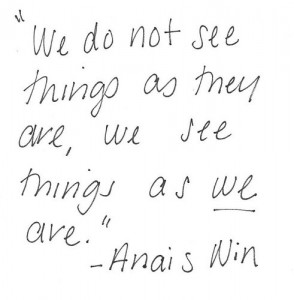A blog comes in handy at times, like when Nora Schenkel‘s piece in the New York Times yesterday was not open for comments. “I Came to Haiti to Do Good…” is one of those pieces that elicits mixed feelings for me as I just came from Haiti just last week. Here’s the messages that a NYT reader could take away from her essay:
- Aid workers are privileged, removed from reality, and wasting their time. (Some are, yes.)
- Haitians are stuck in a cycle of dependency (not a characterization with which I agree) and aid is not helping. (A lot of it is definitely not. I do agree.)
Such frank reflections about the difficulty of “doing good” are still too much of a rarity in the aid industry and in the popular media. As @pj_blue pointed out on Twitter yesterday:
“@intldogooder @pandpvolunteer I think the point being made is that it is easy to be a do-gooder. It’s the actual doing good that is tricky.”
So good for Nora for sharing the realities of her experience and for getting out of the system once she realized it was not for her. The tension between the root causes what aid is trying to solve (poverty, inequality) and aid actors’ own contributions to those dynamics is certainly a difficult one to navigate, especially as a person begins this work. Though as @monasf shared via Twitter:
“@morealtitude @intldogooder @dawnsdigest This is nothing new & lacks the nuance and insight that might come later in a career.”
 I must confess I myself was riding around in a white vehicle last week. Of course, I was doing so to talk with Haitians about how they are able push back on the aid system and on systematic injustices in general.
I must confess I myself was riding around in a white vehicle last week. Of course, I was doing so to talk with Haitians about how they are able push back on the aid system and on systematic injustices in general.
Everywhere I go these days, I’m interacting with a growing cadre of skilled professionals that openly, bravely, and constructively question “business as usual” in the aid industry. If I had written a personal narrative essay for the New York Times this week, I guess it would have read a little more optimistic and it would have included more about assuming our personal responsibilities in supporting those who are bringing about progress and development in Haiti and elsewhere.
I would have wanted to tell the world–change is upon us and here’s how we can all start bringing it about.

“I must confess I myself was riding around in a white vehicle last week. Of course, I was doing so to talk with Haitians about how they are able push back on the aid system and on systematic injustices in general.”
This statement justfies the point of the NYT article, Aid workers always find a way to justify why they are doing what they are dong in the way that they do it. In my opinion to mask the guilt that they struggle with. What gives you an outsider) the authority to come and ask Haitian how they are able to push back on the aid system. I guess since you think your questions were valid that it gives you the right to ride in a white car with Haitians walking for miles around you. Why did you have to ride in a car? Why not support Haitians to ask these questions to further Haitians why do you have to fly all the way there to do it?
Haitians ARE doing this work, supported by Haitians. I was there to tell that very story to a wider audience. I don’t mask my guilt. I do ride in white cars (along with many Haitians by the way). And I am very much grounded in the appropriate roles of outsiders in supporting those who are bringing about change. How do you justify painting all aid workers the same?
Richelle with all due respect and a great deal of curiosity, I did not get out of the NYT article that “Aid workers always find a way to justify why they are doing what they are doing in the way that they do it” and not sure I understand what that means. Why would aid workers need to “justify” their actions, and in what way do they do it that would cause them to struggle with guilt, and why would they have to mask it? It sounds as if you have a story of your own, and would be interested in your perspective.
And here was my response via Oxfam America’s Politics of Poverty blog: http://politicsofpoverty.oxfamamerica.org/2013/05/20/i-went-to-haiti-too/